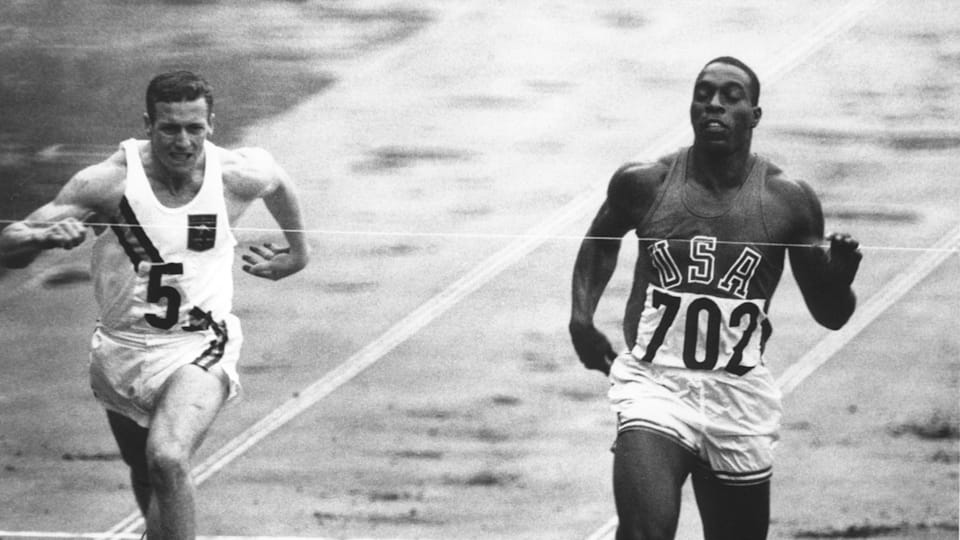Bob 'the Bullet' Hayes runs the fastest time recorded... to this day
In October 1964, Tokyo hosted their first Olympic Games. To celebrate, Tokyo 2020 will bring you some of the most incredible and historic moments that took place 56 years ago. In the latest part of the series, we take a look at Bob Hayes, the U.S. running legend who set a sprint record in Tokyo that stands to this day.

The background
Heading into the Tokyo 1964 Olympics, Bob Hayes was already a world record holder. Just a year beforehand, the sprinter from Jacksonville, Florida, had run the fastest time ever over 100 yards, setting a mark of 9.1 seconds that wouldn’t be beaten for another 11 years.
As a junior athlete, Hayes had shown considerable talent from the very beginning of his career. His first high school athletics meet saw him enter and win no less than seven events (100, 220, 440 and 880 yards, relay, high jump and long jump). And while he had never intended to become a sprinter - his first love was American football - he did harbour a strong desire to go to the Olympics and bring home the gold.
“I didn’t set goals, but I did know that I wanted to be an Olympic champion,” Hayes said while reflecting on his early career. “I wanted to compete in the Olympics.”
In the same vein as some other sprinting greats, such as Michael Johnson, who seemingly defy the conventional wisdom about running technique, Hayes’ sprinting style was far from traditional. He was often slow out of the blocks, but when he hit his stride he would inevitably power past the rest of the field to achieve victory.
Would his unorthodox sprinting style affect his chances as he lined up in the biggest race of his life at the Tokyo 1964 Olympic Games?
The moment
The build-up to the 100m final in Tokyo did not go smoothly for Hayes. Prior to the Games he had been relaxing in the room of the heavyweight boxing gold medallist Joe Frazier, who had been playing around with his kit bag. When Hayes arrived at the Olympic stadium, he realised Frazier had misplaced one of his running shoes.
Frantically, he began questioning his fellow Team USA athletes, asking them what shoe size they were. Finally, Tom Farrell, who was waiting to race in the 800m, entered the arena and offered to lend Hayes his spikes.
But worse was to come for Hayes. Before the race began, the U.S. sprinter was allocated lane one. The final was to be run on a cinder track - the last to be used at an Olympic Games - and lane one had been left in a miserable condition following the 20km race walk that had taken place a day earlier.
Still, Hayes was determined to take his moment, no matter what challenges stood in front of him.
“I’m sizing up the sprinters eyeball for eyeball, I’m projecting if I can win or not,” said Hayes, recalling the moments before the final. “Everything went through my mind. My thinking was ‘I’ve got to win that race’.”
As the starter fired his pistol, Hayes got off to a surprisingly fast start. By the 30m mark he was already leading the field. And as Hayes powered past the finish line, nobody was even close to him as he tied the world record by running 10.06 to secure gold.
But arguably, the best was still to come from Hayes.
Lining up in the 4x100m relay final six days later, Team USA were in disarray. Two of their original lineup - Mel Pender and Trent Jackson - had been injured and had to be replaced by substitutes prior to the race.
By the time the baton was passed to Hayes for the anchor leg, the American athlete found himself behind half the field. What transpired next would be possibly the greatest example of sprint running in history.
Hayes stormed back past the rest of the competition to win gold, doing it in a time that is still contended to be the fastest anchor leg ever recorded:
Estimated as fast as 8.60 seconds.
This time over that speed is faster than Usain Bolt, faster than Carl Lewis, faster than anyone in the long, storied history of the sport.
What happened next?
Perhaps unwisely, the first thing that Hayes did after winning gold was to confront his friend Frazier - the same Frazier who would go on to be undisputed world heavyweight champion of the world and who had misplaced Hayes' running shoe earlier that day.
“I got cocky a bit there," said Hayes jokingly. "I went back to Mr. Frazier and told him I know you’re a world-class boxer Mr. Frazier but if you ever keep one of my shoes again I’m gonna knock you out.”
Following his double gold-winning exploits, Hayes returned to the USA where he was drafted by the NFL American football team Dallas Cowboys. He went on to play for the Cowboys for 11 seasons, becoming the first and only gold medallist to win a Super Bowl.
After retiring from sport, Hayes lived a difficult life that included a stint in prison. The legendary sprinter died at age 59 in 2002, following a long battle with prostate cancer.
